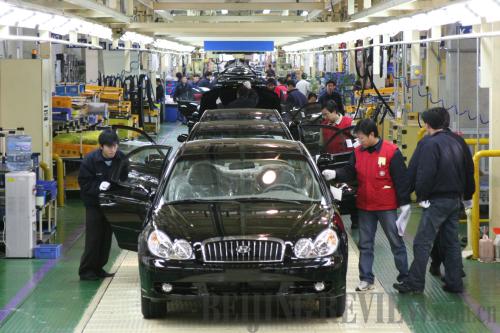|
 |
|
AUTO ALLIANCE: Workers at Beijing Hyundai Motor Co., a joint venture between South Korean carmaker Hyundai and Beijing Automotive Investment Co. (CFP) |
"Given the chilly ties between North Korea and South Korea, it is impossible to resume the six-party talks on the Korean Peninsula nuclear issue in the near future," Shi told Beijing Review.
The six-party talks, which involve North Korea, South Korea, the United States, China, Japan and Russia, were launched in 2003, but became bogged down in December 2008 after six rounds of discussions. North Korea announced its withdrawal from the talks in 2009.
"On the one hand, North Korea now concentrates more attention on its internal affairs after its new leader came to power. On the other hand, 2012 will see presidential elections both in South Korea and the United States, which might affect the two countries' policies toward the six-party talks," Shi added.
"The fundamental thing to ease tensions on the Korean Peninsula depends on North Korea and South Korea. Communications between the two countries and other countries concerned, especially China and the United States, are necessary under the new circumstances. Talks between top leaders of China and South Korea will be helpful for regional stability and the peaceful dialogue between South Korea and North Korea," said CIIS President Qu Xing.
On the economic front, President Lee and Chinese Premier Wen Jiabao vowed to step up efforts to forge a free trade agreement (FTA) and deepen East Asian integration.
While meeting with Wen, Lee emphasized the importance of Sino-South Korean free trade and the fight against trade protectionism. "Against the backdrop of the global financial crisis, both sides regard free trade as the most efficient way to combat the crisis," he said.
"Since South Korea has signed FTAs with the United States and the EU, there are probably fewer barriers between China and South Korea on the issue," said Shi of the CIIS. "A Sino-South Korean FTA will undoubtedly benefit both countries and contribute to regional economic development."
Flourishing trade has been the most impressive area of Sino-South Korean cooperation. Sino-South Korea trade volume now exceeds the South Korea's trade volume with the United States and Japan combined. According to China's Ministry of Commerce, the trade volume from January to November 2011 reached $224.83 billion, increasing 19.5 percent over the same period in the previous year.
China has for years remained South Korea's largest trade partner and largest source of trade surplus. About 30 percent of South Korea's exports now go to China, while South Korea is one of China's major trade partners.
Cultural exchanges have also been active. Personnel exchanges between the two countries reached 6.5 million trips in 2010. About one third of South Korean people have been to China for travel, study or business.
"The economies of the two countries have greatly blended with each other. The rapid growth of South Korea in recent years partly benefited from the development of China," Shi said.
"In addition to its economic significance, politically, the Sino-South Korean FTA will be conducive to bolstering mutual trust," said Shi.
Cui Zhiying, an expert on Korean studies at the Tongji University in Shanghai, said Lee's proposal on the Sino-South Korean FTA would make the bilateral strategic partnership more substantial.
In May 2008, during Lee's first trip to China after taking office, the two sides agreed to upgrade their ties to a "strategic partnership" to expand their cooperation. Bilateral political relations, however, suffered setbacks following the sinking of South Korea's Cheonan warship and the shelling of the Yeonpyeong Island in 2010. As a result, their relationship still cannot be deemed as "strategic cooperation," Cui said.
"Lee's visit and the FTA plan will give a boost to Sino-South Korean relations and make their partnership more substantial," he said.
Email us at: yulintao@bjreview.com | 